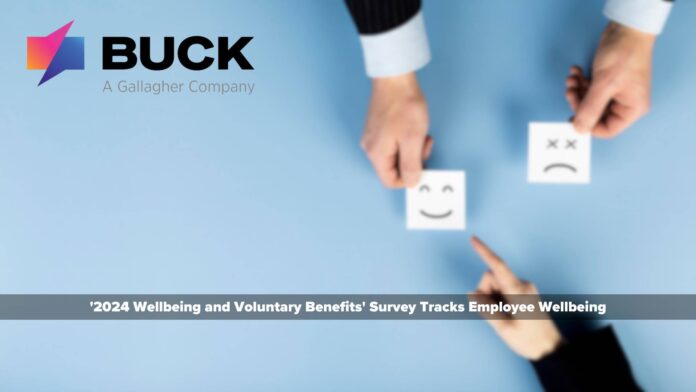While employers have made progress on employee wellbeing initiatives during the past few years, employee expectations about these benefits also continue to rise, according to Buck, a Gallagher company.
Buck’s biennial 2024 Wellbeing and Voluntary Benefits Survey tracks employee wellbeing and explores how U.S. employers rate the mental and emotional, financial, social and physical health of their workforce.
The survey found an increased focus on wellbeing in the workplace, with employers more aware of employees’ struggles with physical, mental, social and financial health. Almost three-quarters (74%) of organizations have increased their commitment to wellbeing programs and the top reasons cited for expanded resources are talent attraction/retention (66%), followed by increased job satisfaction (65%) and support for mental health (59%).
Employees also want more resources to support their wellbeing journey and very few ranked themselves as fully “healthy.” The data does show some improvements in employees’ self-perceptions of their overall wellbeing, but a concerning 1 in 5 respondents report worsening mental, physical, and financial health. Employees rank their financial wellbeing the lowest and 92% want more related resources.
“We’re seeing that employees now expect their employer to offer even more support for their wellbeing, and this need underscores the importance of employer-sponsored benefit programs,” said Tom Kelly a principal in the Health and Benefits Practice at Gallagher, and co-author of the report. “A troublesome 2 in 3 employees would change their jobs for better benefits, and 46% of workers are actively considering a job change in 2024, compared to only 35% in 2022. Younger workers are significantly more likely to pursue a job change, coming in at 53% for Gen Z.”
Key findings
Employee responses point to the growing importance of wellbeing programs:
- Only 66% of employees rate themselves financially healthy, the lowest across all dimensions of wellbeing, while 55% say they are doing the same or worse financially compared to a year ago.
- 56% say inflation and/or rising costs will delay or impact their ability to obtain healthcare in the coming year.
- 1 in 4 employees report they aren’t satisfied with their jobs or aren’t able to be productive, indicating job dissatisfaction may be more common than employers realize.
- Wellbeing and benefits are highly correlated with an employee’s intent to stay with their employer.
Employers recognize the importance of voluntary benefits and 86% agree these programs are key to their wellbeing strategy. However, the findings show a continued struggle to build awareness among employees.
- 74% of employers say they’ve increased their commitment to wellbeing, but only 50% of employees say they’ve seen an increase in support.
- 55% of employees want a better understanding of their benefits and 80% want to talk to someone about their benefits, indicating that an over-reliance on digital tools by employers may need to be rethought.
“Among the top factors influencing employee job satisfaction and engagement are an employer’s commitment to supporting wellbeing and a benefits package that meets their personal needs,” said Ruth Hunt, a principal in Gallagher’s Communications practice, and co-author of the report. “The data clearly shows that voluntary benefits can play a key role in workforce retention, especially in a market where big pay bumps are cooling. And organizations likely need to revisit their communication strategies to enhance employee education and increase use of benefits, to drive desired outcomes and results.”





